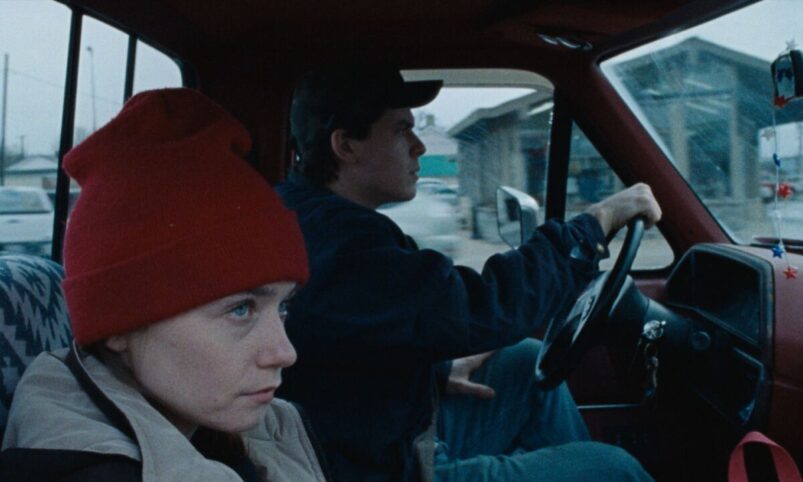Holler follows Ruth, a teenager living in a poverty-stricken community in rural America. With struggling opportunities, her life seems to take a turn for the better when she is accepted to a college. Along with her brother, she joins up with a scrap metal crew to build up the funds to pay for her education. However, as she gets closer to reaching her goal, she finds herself torn between the promise of a hopeful future and the brother who helped raise her.
Holler is the directorial debut for Nicole Riegel. Premiering at the Deauville American Film Festival in September of 2020 before its worldwide release in June 2021, the film was originally supposed to appear at the 2020 iteration of South By Southwest, however the COVID-19 pandemic delayed its release. It’s a shame that this film didn’t come out sooner, because it’s a fantastic piece of cinema. It takes the trope of “one day, I’m going to leave this crummy little town and I’m going to do something with my life” and turns it into something poignant.
Jessica Barden stars as Ruth, and though she performs her role well enough, her character feels more like an Americanised version of Alyssa from The End of the F**king World than a truly unique character. That’s not to say she’s a bad actress, it’s maybe more a reflection of the writing for her particular role. As for the rest of the cast, they serve their purpose well enough. The only other characters really worth noting in the side cast are Ruth’s brother, Linda – who acts as Ruth’s surrogate mother – and Hark, the head of the scrap team and a minor antagonist to the plot – though debatably, there are no true antagonists in this movie, just people struggling to get by.
The writing suffers from otherwise simplistic characters – most of them lack depth and don’t really have anything remarkable about them, they exist simply to help tell a story. And in that storytelling, Holler flourishes. It excels at being an empathetic viewing experience and hopefully, in the future, will stand as a noteworthy creative piece about the real-life experiences of downtrodden Americans who lived during the Trump administration.
One aspect that I appreciate about Holler is the way it’s framed. Every so often, the film draws attention back to the factory that dominates the town and functions as a plot element in Ruth’s story. All the colours are muted so that murky browns or cold blues dominate the screen, reflecting the wintery landscape and at times depressing tone. It also functions to draw focus to Ruth, with her red hat and clothes standing out against the backdrop. You can argue that from an artistic standpoint, this reflects her fiery nature as a character, but a more simplistic observation is that it looks pretty.
The other elements that make up this film aren’t necessarily worth noting. The soundtrack functions as cinematic wallpaper – something that you notice is there, but isn’t anything you pay particular attention to (though the song at the end of the movie is lovely). The production value is also fairly low. However, it is one of those few films that doesn’t need a complex piece of orchestral music to pluck at the heart strings of the viewers, or grandiose cinematography to wow the audience. The story in and of itself is more than enough. The pacing is a bit slow, and for a drama, there are only a few truly gripping moments. Some people might even find it a bit boring in the way that it hinges on the will-she-won’t-she plot, but that’s okay. Not every piece of art is going to be truly appreciated for what it is by everyone.
Holler represents how well a film can do without a big budget or Hollywood-levels of production. Sometimes all you need is a good idea and a well written script – even if the characters can initially come off as bland. For many people in the States, this film is more a reflection of the day-to-day realities of life than it is a piece of fiction. And as a movie that pays homage to the experiences of these people, this film is definitely worth watching. Not everyone may find the same level of enjoyment from it, but it’s still a must see.
Review screener provided.
READ NEXT: 15 Best Feel-Good Movies On Amazon Prime Video
Some of the coverage you find on Cultured Vultures contains affiliate links, which provide us with small commissions based on purchases made from visiting our site. We cover gaming news, movie reviews, wrestling and much more.




